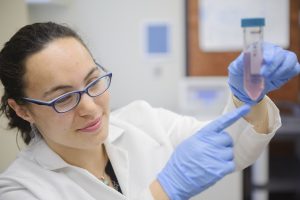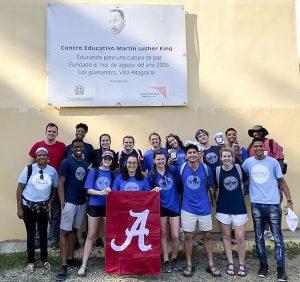By David Miller

Joline Hartheimer is under no illusions about her upbringing in northern New Jersey, where she went to a “great high school” and lived in a “privileged” community.
Hartheimer enrolled at The University of Alabama four years ago, beginning a path to service that has helped shape her personal and career goals. Her enlightenment started during her freshman year, when she became a tutor through UA’s Center for Academic Success and began meeting students who’d attended high schools that didn’t offer chemistry.
“Some of these students were nursing majors,” Hartheimer said. “That made me realize there are a lot of structural inequalities in our society.
“People can’t change what they’re born into, and I want to share the privilege I had. I was lucky.”
Since then, her time at the Capstone has further illuminated issues of inequality, insecurity and poverty, and how she can create change through her desired career in public health. Hartheimer will graduate in May with a bachelor’s degree in chemical engineering. She’ll then begin medical school at the University of North Carolina.
To prepare for a future career in public health, Hartheimer immersed herself in service work while at UA. She joined UA’s Center for Service and Leadership and has participated in numerous Beyond Bama alternative break service trips throughout the United States and abroad. Through these trips, UA students assist in disaster recovery and work with community partners on multiple social justice issues, all while developing stronger bonds with classmates, many of whom they’ve never met.
“Part of Beyond Bama is the discussions we’d have each night about the service and the circumstances surrounding that,” Hartheimer said. “Those were some of the realest conversations I’d ever had. That’s when I knew this was an organization I want to be a part of.”

Hartheimer has led six Beyond Bama trips and has helped the program develop sustainable relationships with community partners, like Give Kids the World, All Hands and Hearts, Wine to Water, and the United Saints Recovery Project.
One of those early trips had the most impact in helping shape Hartheimer’s perceptions of need and strengthening her empathy for those less fortunate than herself. In 2016, she led a trip to Baton Rouge, Louisiana, after residents evacuated to avoid major flooding in the city. Students were tasked with removing floodwater-soaked belongings and drywall from homes to help residents create a “fresh start” for rebuilding.
“You could see someone’s house just as they left it,” she said. “They had a bag of goodwill clothes in the closet, toys were on the floor … and I was thinking, ‘this could have been me.’
“People might be anywhere on the spectrum of what we call the ‘active citizenship model’ when they enter college, but we’re able to move those students further forward and open their eyes.”
Earlier this semester, Hartheimer was the recipient of the Algernon Sydney Sullivan Premier Award, one of five UA Premier Awards for leadership, scholarship and service. The nomination process included an essay that detailed how her work at UA will inform her future career, to which Hartheimer credits her experiences in helping the CSL build networks with community organizations to identify local needs, as well as her undergraduate research experience in Dr. Yonghyun Kim’s lab in the chemical and biological engineering department.
Hartheimer said Kim’s mentorship came with high expectations: she was in charge of her own project and presented her work at lab meetings and national conferences. Her research focus was glioblastoma – an aggressive, common and deadly form of brain tumor – and how to improve the effectiveness of chemotherapy on the drug-resistant cancer stem cell population.
Hartheimer said the independence she was afforded to investigate her own topics has empowered her to do the same, professionally, when she identifies needs.
“I spent a lot of time working in Dr. Kim’s cancer research lab, and through that, I learned about all these diseases that are so complex and require us to create new models for studying,” she said. “So I understand that medicine is about science and discovery, but there are so many other things that affect the patient besides medication. Social history — like the backgrounds my patients might be coming from and the unique things that could affect them — is so important, and I’ve learned a lot about that in Beyond Bama trips.
“I’m very thankful to UA for being such a welcoming place, and for its focus on serving the needs of the state of Alabama, while empowering students to explore those needs and contribute to the broader population.”
